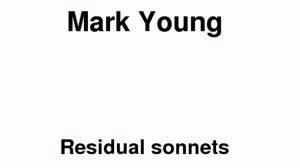
Mortal Trash: Poems by Kim Addonizio / W. W. Norton / 978-0-393-35434-8 / paperback / August 1, 2017
I’ve reviewed Kim Addonizio before, for her short story collection The Palace of Illusions (2015). I still think of her as a poet, though she’s one of those rare writers that can write both, plus non-fiction (like in her essay collection Bukowski In A Sundress (2016), but also in two books on the craft of writing poetry). All of her writing, including in her latest collection of poems, Mortal Trash, is gritty, with a wry, dark sense of humor/ But sometimes she can just get plain dark.
Addonizio has been more of a lyric poet, with her/an ‘I’ figuring prominently in poems, though one section of Mortal Trash, “The Sonnets,” is a nod to Ted Berrigan, emulating his playing with the traditional sonnet form, mostly keeping the 14 lines, but dropping the iambic pentameter and rhymes, making some more collage-like by using lines from other poets and even re-using lines from one poem to another. As with Berrigan, her humor still comes through, though again, that can tend to the dark side, like in “Sonnet 12”:
I hate clocks & mirrors I hate all roses
& trees especially trees even evergreens
are felled & strung with lights & ornaments
I hate ornaments & windup crèches
playing “Silent Night” with plastic cows breathing
over a plastic baby I hate babies please don’t have one
it will ruin your beautiful tits forever
you’ll have to push a stroller a 40-pound shopping cart
before you like a plow eighteen years you’ll toil
what a waste paint something green
get a show somewhere with white walls
& people drinking wine I love wine I love
taking it in my mouth then kissing
it into yours having enough / & time
Whether playing with form or in lyric free form, Addonizio continues to channel Anne Sexton, writing (sometimes) about uncomfortable and unpleasant life-experiences, in sex and/or in the lack of it, the lack of desire and love in life. This may make some readers feel uncomfortable, and Sexton (and, say, Sylvia Plath) was labeled a “confessional” poet because of this, by critics who didn’t think poetry should be about uncomfortable topics. I won’t go into that, it’s been flogged with a wet noodle for decades now, but while some poetry critics might push Addonizio into this so-called ‘confessional’ camp, and while she might even ‘own’ that label (I’m not sure, probably not, but she might in a fuck-you kind of way because she’s that badass) the poem “Florida” (of which I only have room for the first half) is an example of how those critics are so wrong:
And then there was the man who said “You look fatter
with your clothes off” and like a fool I didn’t put them back on
but climbed into his bed beneath the little Tibetan prayer flags
and several images of Buddha haloed by a white light
I wished, at that moment to dematerialize into,
especially when he asked me to get on top, but facing away from him,
so that I rose up and slid down looking at the knees and naked feet
of someone whom, an hour ago, I’d found attractive—in a way, I realized,
it was now a blessing not to have to look into his eyes, but still,
being fucked backwards while facing a stain on the wall that resembled Florida
was not quite the encounter I’d envisioned
standing in the bookstore that the Beats with their Blakean visions
and holy passionate excesses had made famous,
and my mind began to wander in order to avoid being present
for whatever was going on down there, eternally, it felt….
A confession implies some kind of shame of the speaker’s, period, end of poem. But here she is shamed, he shames her, or wants to, or does so without even realizing he’s doing anything wrong, which would be a great dig at all the supposed Buddhists who use the practice as a way of avoiding responsibility, if the situation wasn’t so messy, because there is some avoiding of responsibility on the woman’s part too, by not leaving. Instead, she disassociates, internalizing her shame, into “anger,” at the dude, but also at herself. The situation complicates even more when the speaker later calls the man her “lover.” Why? I’m not sure, nor am I sure either the speaker or Addonizio do, but this ambiguity makes the poem more interesting, because messy and more human.
Addonizio also has a side gig as a blues harmonica player, which informs her writing somehow. That is, in Mortal Trash especially, I hear her as a blues poet, ‘singing’ about the bad/sad things in life, in common American vernacular, but processed through humor. Even the more serious poems are counterbalanced in this collection by the darkly humorous ones. Laughing in the face of despair.





Leave a Reply